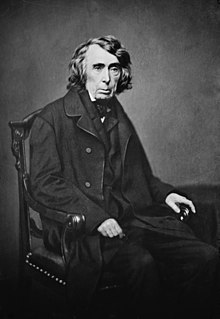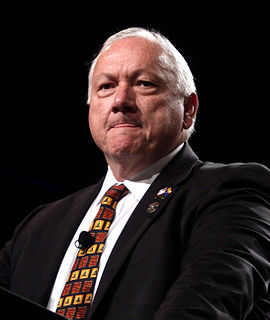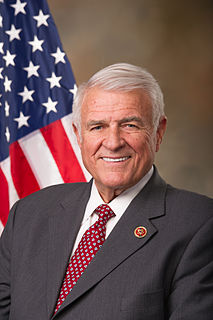Ein Zitat von Thomas Jefferson
Meiner Ansicht nach liegt die Grundlage der Verfassung darin, dass „alle Befugnisse, die weder durch die Verfassung an die Vereinigten Staaten delegiert noch den Bundesstaaten verboten sind, den Bundesstaaten oder dem Volk vorbehalten sind.“ Einen einzigen Schritt über die so speziell um die Befugnisse des Kongresses gezogenen Grenzen hinaus zu gehen, bedeutet, ein grenzenloses Machtfeld in Besitz zu nehmen, das keiner Definition mehr zugänglich ist.
Verwandte Zitate
Zu behaupten, dass der Kongress über allgemeine Polizeibefugnisse verfügt, würde bedeuten, dass er befugt ist, Ziele zu erreichen, die nicht der Regierung übertragen sind, und die Umsetzung des 10. Verfassungszusatzes zunichtezumachen, indem man erklärt, dass „die Befugnisse, die den Vereinigten Staaten nicht durch die Verfassung übertragen werden, auch nicht übertragen werden.“ die darin den Staaten verboten sind, sind den Staaten bzw. dem Volk vorbehalten.
Meiner Ansicht nach ist es der Regierung der Vereinigten Staaten durch die Verfassung untersagt, sich in religiöse Institutionen, deren Lehren, Disziplinen oder Übungen einzumischen. Dies ergibt sich nicht nur aus der Bestimmung, dass kein Gesetz über die Gründung oder freie Ausübung einer Religion erlassen werden darf, sondern auch aus der Bestimmung, die den Staaten die Befugnisse vorbehält, die nicht an die Vereinigten Staaten delegiert wurden. Sicherlich wurde dem Generalgouvernement keine Befugnis übertragen, religiöse Übungen vorzuschreiben oder Autorität in irgendeiner religiösen Disziplin zu übernehmen. Es muss dann bei den Staaten liegen.
Da es sich bei den Vereinigten Staaten um eine begrenzte Regierungsform handelt, unterliegt sie unter anderem hinsichtlich ihrer Befugnis, Steuern zu erheben. Die Staaten können sie für eine Vielzahl von Zwecken erheben, für die der Kongress dies nicht tun kann, da den Staaten alle Befugnisse gehören, die nicht an den Kongress delegiert sind.
Die Verfassung ist kein Gesetz, aber sie ermächtigt das Volk, Gesetze zu erlassen ... Die Verfassung sagt uns, was kein rechtmäßiges Gebot sein darf ... Der Gesetzgeber hat uns das Privileg überlassen, Gesetze zu erlassen, die nicht im Widerspruch dazu stehen die Verfassung der Vereinigten Staaten... Die verschiedenen Staaten und sogar der Kongress selbst haben viele Gesetze verabschiedet, die der Verfassung der Vereinigten Staaten diametral widersprechen.
Die Konstruktion galt. . . zu jenen Teilen der Verfassung der Vereinigten Staaten, die dem Kongress eine Befugnis übertragen. . . Es darf nicht so ausgelegt werden, dass sie selbst unbegrenzte Befugnisse verleihen, noch darf ein Teil so aufgefasst werden, dass der gesamte Rest dieses Instruments zerstört wird.
In den Vereinigten Staaten haben wir praktisch zwei Regierungen ... Wir haben die ordnungsgemäß konstituierte Regierung ... Dann haben wir eine unabhängige, unkontrollierte und unkoordinierte Regierung im Federal Reserve System, die die Geldbefugnisse ausübt, die dem Kongress vorbehalten sind die Verfassung.
Die Verfassung der Vereinigten Staaten bedarf einer angemessenen Auslegung ihrer Sprache und ihrer Befugnisse unter Berücksichtigung der Ziele und Zwecke, für die diese Befugnisse übertragen wurden. Mit einer vernünftigen Auslegung meinen wir, dass für den Fall, dass die Wörter zwei verschiedene Bedeutungen haben, die eine strengere und die andere erweiterte, diejenige angenommen werden sollte, die am ehesten mit den offensichtlichen Zielen und Absichten der Verfassung übereinstimmt.
Es würde das gesamte Instrument auf einen einzigen Satz reduzieren, nämlich die Einsetzung eines Kongresses mit der Macht, alles zu tun, was zum Wohle der Vereinigten Staaten ist; und da sie die alleinigen Richter über Gut und Böse wären, wäre es auch eine Macht, alles Böse zu tun, was ihnen gefällt. . . . Sicherlich sollte ihnen keine solche universelle Macht verliehen werden. Sie [die Verfassung] sollte sie direkt in die aufgezählten Befugnisse und diejenigen einordnen, ohne die diese Befugnisse als Mittel nicht ausgeübt werden könnten.



























